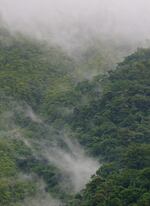
Mist in the rainforest on the slopes of the Arenal Volcano, Costa Rica.
Tom Schwabel, Oregon State University
Chris Wolf and his colleagues at Oregon State University had a question. They wanted to figure out which is worse: chopping down an acre of woods in a forest that’s already been disturbed or chopping down an acre of woods in a forest previously untouched by humans.
Going into the study, he said, “we were more concerned about forest loss in areas that had already experienced a great deal of forest loss.”
Wolf and his team hypothesized that cutting down a last little patch of remaining forest would have disastrous effects for biodiversity.
But they were wrong. Their analysis of forests across the globe, published this week in Nature, showed that the first trees humans cut down in a forest are the most harmful for wildlife and biodiversity.
“When people are going in to chop down forests, initially they’ll build roads into these regions,” Wolf explained. “And these roads allow people to go in and do sort of bush meat or wild meat hunting, which puts a lot of pressure on the species. They also can be sort of a pathway for introduction of new diseases, also invasive species.”
In other words, people's first extractive activities in a forest set off a cascade of biodiversity loss.Wolf said there are a lot more intact, diverse forests left in the Pacific Northwest than elsewhere in the US, and his research indicates it’s important to leave them that way.
